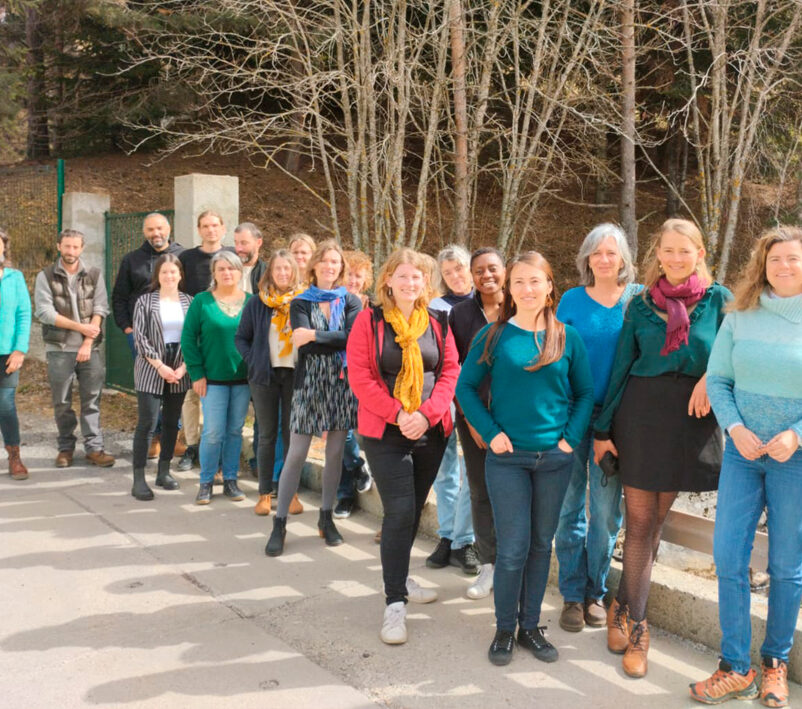Representatives of the six centers collaborating in this POCTEFA project met in Northern Catalonia (France) to discuss the main lines of action.
The Forest Science and Technology Center of Catalonia (CTFC) participates in the POCTEFA GESTAS project (Cross-border sustainable management of wild species in natural areas), which seeks to promote the protection and biodiversity to reconcile the preservation of aromatic and medicinal species and the natural areas in which they grow, with the commercial use of wild resources in the participating regions (Catalonia, Aragon, Hautes Pyrénées, Eastern Pyrénées and Ariège). The project will develop three main aspects: to know the conservation status of the species and the activity of wild collection, to propose sustainable management and evaluate the cultivation, and finally, to transfer the results and raise awareness among the actors of the sector and the general public.
Representatives of the entities participating in the project met in Matamala (France) to discuss the main lines of action of GESTAS, which began in January 2024 and will last for three years. The project is 65% co-financed by the European Regional Development Fund (ERDF) through the INTERREG VI-In Spain-France-Andorra Program (POCTEFA) 2021-2027, with a total budget of 1,135,958.19€.
Coordinated by the CTFC, the project also involves the Conservatoire Botanique National des Pyrénées te de Midi-Pyréneees (CBNPMP), the Regional Natural Park of the Catalan Pyrenees (PNRPC), the Institut Technique Interprofessionnel des Plantes à Parfum, Médicinales, Aromatiques te Industrielles (ITEIPMAI), the Centre de Formation Professionnelle te de Promotion Agricole (CFPPA- Ariège-Comminges), and the Centro de Investigación y Tecnología Agroalimentaria de Aragón (CITA).
The coordinator of this project is Eva Moré, from the Aromatic and Medicinal Plants Group of the CTFC, in which also participates Roser Cristóbal, head of this working group of the Bioeconomy, Health and Governance Program of the CTFC. The CTFC will lead the awareness action and will participate in all the activities planned, mainly in its implementation in the Catalan territory. The CTFC will have the collaboration of different associated entities: Associació de propietaris Forestals Serralada Prelitoral del Penedès, Associació Flora Catalana, Servei de Gestió de Parcs Naturals de la Diputació de Barcelona and the Direcció General d’Ecosistemes Forestals i Gestió del Medi del Departament d’Acció Climàtica, Alimentació i Agenda Rural.
GESTAS will work with to reconcile the preservation of species and natural areas and the commercial exploitation of wild resources in view of the current commercial overexploitation of some wild species that compromises the conservation of biodiversity in some natural ecosystems of the POCTEFA area.
We will intervene in different areas of knowledge (ecology, biology, regulation, cultivation, social impact, and economics), proposing harvesting guidelines for those species collected in greater volume or more vulnerable, studying the feasibility of their cultivation in agroforestry scenarios and raising awareness among the different actors in the value chain and among the general public.
With the implementation of the project, sufficient information will be obtained to be able to contrast the legal framework that protects the harvesting of wild aromatic-medicinal and ornamental green species on both sides of the border and to propose new measures that act in a homologous way, define management plans for the selected species adapted to the different situations and agreed upon by the actors of the sector, which allow maintaining and regulating the harvesting activity so that it is sustainable.
At the same time, training activities and materials will be developed for different target groups (managers of natural areas, owners, collectors, marketers, etc.) and dissemination will be complemented with activities to raise consumer awareness of the importance of knowing the wild origin of the raw plant material and that it has been obtained sustainably.
According to the experts, transboundary action is needed to avoid the migration of harvesting to less regulated areas that can withstand excessive pressure that will end up damaging agroforestry systems.

Last modified: 3 April 2024










